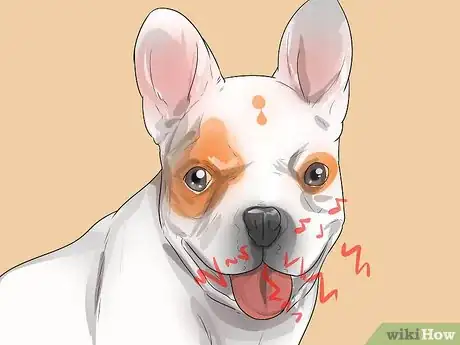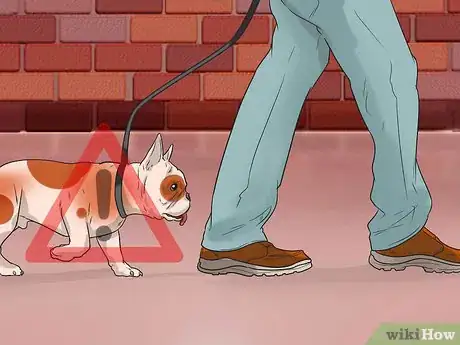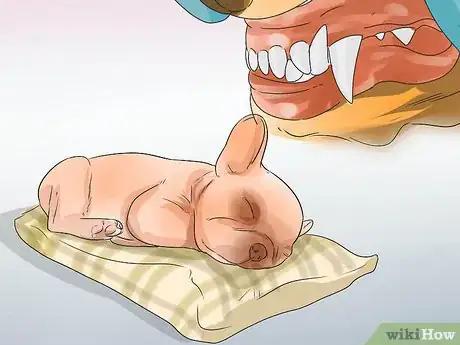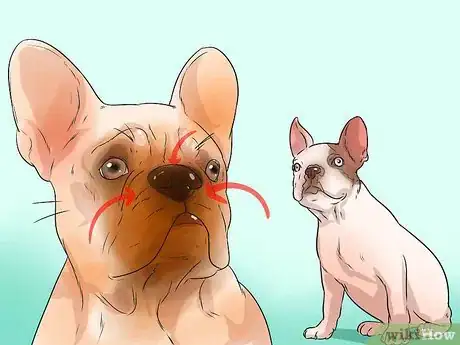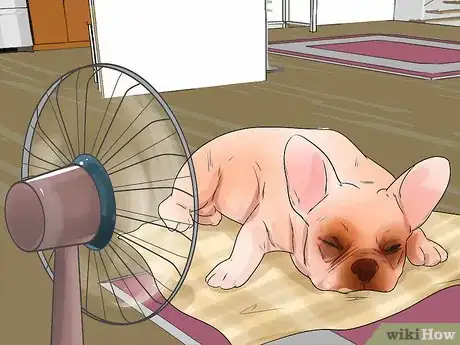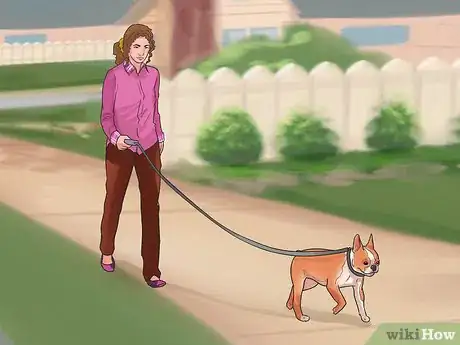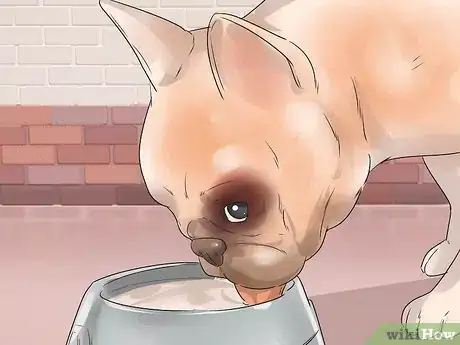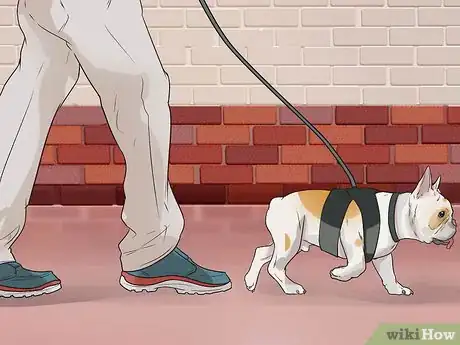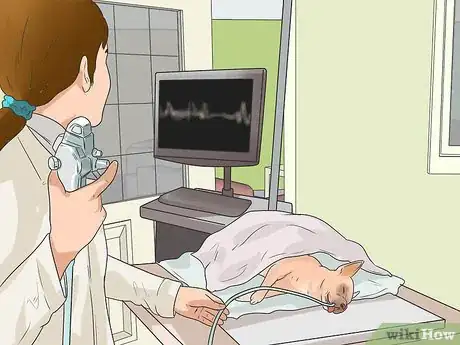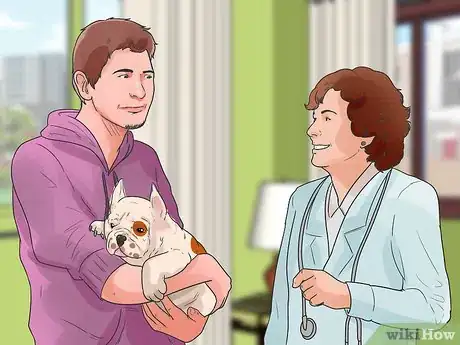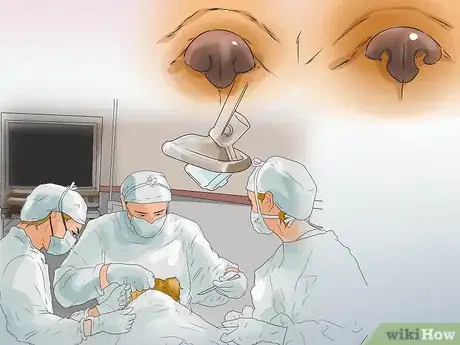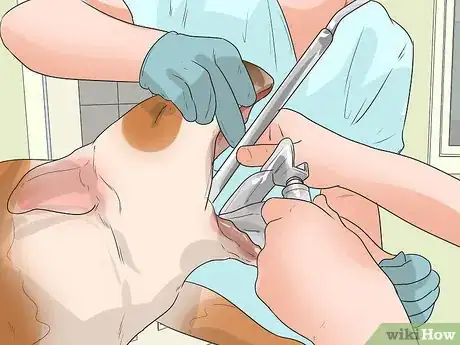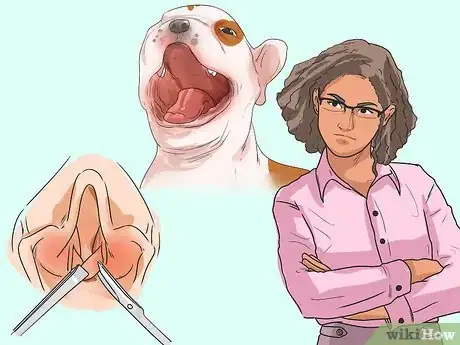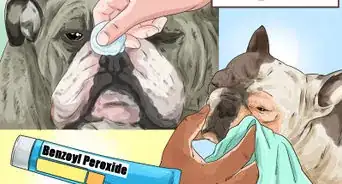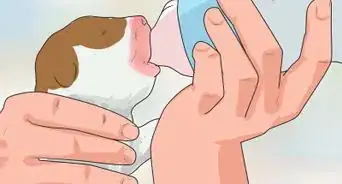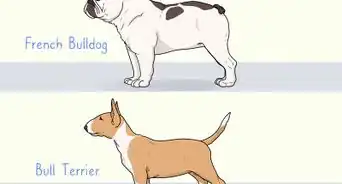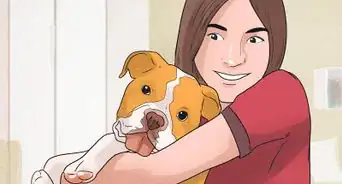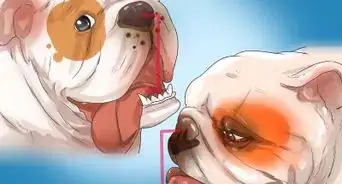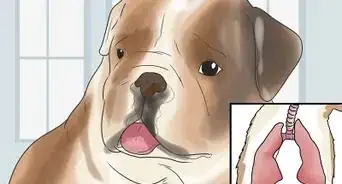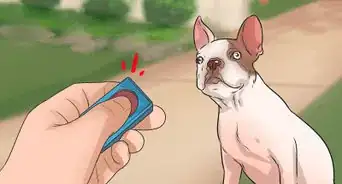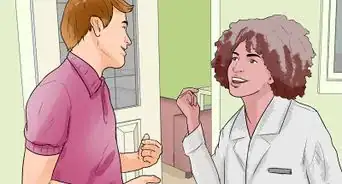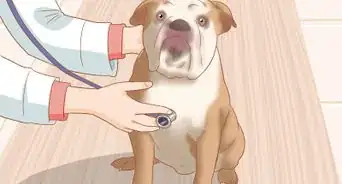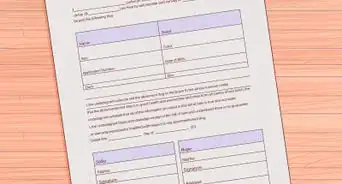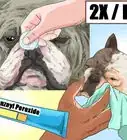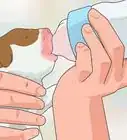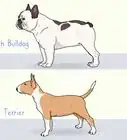This article was co-authored by Pippa Elliott, MRCVS. Dr. Elliott, BVMS, MRCVS is a veterinarian with over 30 years of experience in veterinary surgery and companion animal practice. She graduated from the University of Glasgow in 1987 with a degree in veterinary medicine and surgery. She has worked at the same animal clinic in her hometown for over 20 years.
This article has been viewed 95,179 times.
With its flat-face and bat ears, the French bulldog definitely has a distinctive appearance.[1] Its flat face gives it a child-like appearance that, unfortunately, also causes it breathing problems, specifically a malformation called Brachycephalic airway syndrome.[2] There are some strategies you can put in place to treat the problem at home, but in many cases corrective surgery may be necessary.[3]
Things You Should Know
- If your French bulldog seems lethargic or they won’t stop breathing, give them a break; you can tell a dog is having breathing issues if they’re drooling excessively.
- If your bulldog’s gums turn blue or they collapse, take them to the vet immediately.
- Keep your Frenchie hydrated and cool; overexercise and excessive heat can make it hard for a French bulldog to breathe.
- Talk to a vet about potential surgical interventions, like soft palate or nostril surgery, which will make it easier for your dog to breathe.
Steps
Identifying the Signs of Breathing Problems
-
1Pay attention to breathing noises. Many of the snorts and snores that French bulldog owners take for granted are actually symptoms of their breathing distress. These signs include heavy panting, even at rest, and snoring when the dog is asleep. A dog that can breathe easily should not make much noise at all.
- If it sounds like your dog is struggling to breathe, especially when it has not been doing a lot of exercise, that is not normal and the dog should be looked at by a vet.
- A dog with breathing problems may also make choking sounds when over excited, and struggle to exercise in hot weather.
-
2Be alert. When exercising, the dog's breathing noises may become more exaggerated and more desperate. The dog may even drool heavily, rather than take time out from breathing to swallow.[4]
- This is a clear sign that your dog needs a break. It may not want to take one but it is your job to make it take a break until its breathing recovers.
Advertisement -
3Look for signs of oxygen deficiency. In extreme cases, the dog may not be able to get enough oxygen to oxygenate its blood. This will result in its gums and tongue turning blue. [5]
- Complete collapse and loss of consciousness is not unheard of when French bulldogs are over exerted and lacking oxygen, especially in hot weather. To avoid this, try not to over exert your French bulldog on hot days or at all if you know they are already having problems breathing.
- If you see these symptoms, you should take your dog to a veterinarian immediately. A veterinarian will be able to give the dog emergency oxygen.
-
4Understand breathing problems. To understand treatment, it's helpful to understand the problem the French bulldog faces. Selective breeding for the flat face has created anatomical problems that make it difficult for these dogs to breathe.
- Many of these problems are due to the reduced size of the bony cavity of the nose while soft tissue structures, such as the tongue and soft palate, remain the same size. In the French bulldog's case this means his tongue and soft palate take up too much room and literally choke. Added to this, there are other anatomical problems.
- The French bulldog has unnaturally narrow nostrils. This makes it difficult for it to draw air in through its nose. This is one reason why the breed pant a lot, because they need to breathe through their mouth.[6]
- The tongue did not shrink back at the same time the nose shortened, so a large tongue has to fit into a smaller space. This takes up room in the mouth and tends to block the back of the throat.[7]
Caring For Breathing Problems at Home
-
1Keep your French bulldog out of the heat. Be aware that the French bulldog will struggle to breathe more than other breeds in hot weather, as it is already panting hard just to breathe.[8] It is essential to keep the dog cool in hot weather and not exercise it in the heat of the day.
- Make sure your French bulldog always has access to shade. It should never be left out in full sun. Keeping a French bulldog tied up in the sun can overheat it really quickly, even if it is not exercising.[9]
- If you know the day is going to be hot, consider keeping your dog in an air conditioned space.
-
2Give your dog exercise breaks. When going for walks, let your dog stop and rest frequently. If its breathing becomes exaggerated, labored, or increasingly distressed, then stop immediately and cool the dog down.
- You can cool an overheated dog down by giving it water to drink and by pouring water on its body. Just make sure that the water is not too cold. It shouldn't be ice cold, but instead only slightly cold so that it doesn't shock the dog's system.
-
3Keep the dog hydrated. Always take plenty of water with you on walks, especially if it is warm outside. Be sure to let your dog stop and drink frequently.
- Allowing the dog to drink water will help to keep the dog cool.
-
4Use a harness rather than a collar when walking your French bulldog. A collar will restrict your dog's breathing even further, especially if it likes to pull on its leash. Instead, use a harness the does not have any contact with the dog's throat.
- Make sure to get the right size harness and fit it to your dog. Follow the directions on the packaging so that the harness is neither too loose nor too tight.
Treating Breathing Problems With Surgery
-
1Learn about your dog's breathing. With Brachycephalic airway syndrome, the bony chamber of the nose is physically smaller but the soft palate that separates the back of the nose from the throat remains the same size. This is like having a curtain that's too long for a window in place. As the dog breathes in, the pressure change tends to suck the soft palate against the entrance to the trachea (windpipe), blocking it off.[10]
- This causes the French bulldog to choke and gasp for breath.
- Laryngeal saccules also affect breathing. These are tonsil like tissue located just inside the larynx (voice box). Changes in air pressure created by the anatomical changes have the effect of sucking the laryngeal saccules in the way of the trachea, and block it.
- Also, a hypoplastic trachea impacts breathing. The windpipe of French bulldogs can be much narrower than a normal windpipe. This produces increased resistance to airflow and yet more breathing problems.[11]
-
2Talk to your vet. They will be able to diagnose breathing problems and help you to decide if you're open to the idea of surgery. Assess how bad your dog's breathing is and whether you are willing to change it surgically. Some dogs struggle so hard to breathe that corrective surgery is required to improve their quality of life.
- It's important to discuss whether or not your dog should get surgery with your dog's veterinarian.
- Unfortunately, some problems, such as the hypoplastic trachea and a large tongue, cannot be changed with surgery.
-
3Consider nostril surgery. Under general anesthesia, the vet cuts out a triangle of flesh from the outside border of the nostrils. This will create a larger gap for air to pass through.[12]
- The effect of widening the nostrils makes it easier for the dog to breathe through its nose.
-
4Discuss the option of soft palate resection. Under anesthesia, the surgeon assesses how much extra tissue there is at the back of the throat. He or she then trims the soft palate back.[13]
- The aim is to resect (remove) enough so that there is no tissue flapping in the turbulence of the opening to the windpipe.
-
5Consider resection of the laryngeal saccules. The vet may opt to resect the laryngeal saccules. This surgery removes two obstructions from the crowded space at the back of the throat, allowing more space for air to pass.[14]
Warnings
- Ultimately, the health and welfare of this delightful breed depends upon changing the breed standard so that a longer nose is accepted, and the trend for selecting for dogs with extremely flat faces is reversed.⧼thumbs_response⧽
References
- ↑ http://dogtime.com/dog-breeds/french-bulldog
- ↑ http://www.vcahospitals.com/main/pet-health-information/article/animal-health/brachycephalic-airway-syndrome-in-dogs/2143
- ↑ http://www.vcahospitals.com/main/pet-health-information/article/animal-health/brachycephalic-airway-syndrome-in-dogs/2143
- ↑ http://www.frenchbulldogclubofengland.org.uk/general-health-info.html
- ↑ http://www.frenchbulldogclubofengland.org.uk/general-health-info.html
- ↑ https://www.acvs.org/small-animal/brachycephalic-syndrome
- ↑ https://www.acvs.org/small-animal/brachycephalic-syndrome
- ↑ http://www.vcahospitals.com/main/pet-health-information/article/animal-health/brachycephalic-airway-syndrome-in-dogs/2143
- ↑ http://www.frenchbulldogclubofengland.org.uk/general-health-info.html
About This Article
To treat breathing problems in your French bulldog, keep it in the shade or an air conditioned room, since it will struggle to breathe if it gets too hot. When you walk your dog, let it rest frequently to keep it from overexerting itself. Additionally, consider using a harness instead of a collar, which can restrict its breathing even more. You should also offer your dog cool water to drink, or pour the cool water on its body to cool it down. For tips on how to treat breathing problems in your dog with surgery, keep reading!
